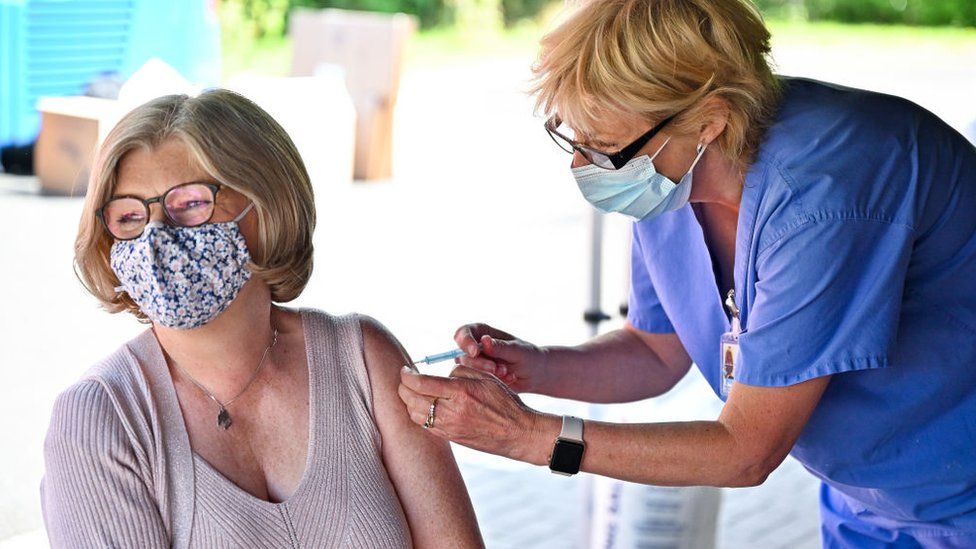ARTICLE AD BOX
 Image source, Getty Images
Image source, Getty Images
Scotland's national clinical director said the easing of face mask rules in care homes and healthcare settings was a "good thing".
Prof Jason Leitch said Covid would be treated like any other respiratory disease.
The return to pre-pandemic guidance comes more than three years on from the start of Covid face mask restrictions.
Some individual health and social care settings may still ask people to wear masks for infection control reasons.
The change comes two weeks after the World Health Organization (WHO) declared that Covid-19 no longer represents a "global health emergency".
Speaking to the BBC's Good Morning Scotland programme, Prof Leitch said the move allowed countries to make risk-based choices.
"One of the things we had was extra rules about face coverings for Covid - now we're going back to standard rules," he said. "Everyone is fatigued with a global pandemic.
"But I've been in environments where alcohol gel has re-appeared. Vaccination numbers would suggest that the country still cares enough to know that the principal protective route is available and people are still staying off a bit more when they're sick.
"We're downgrading the use of face coverings [in healthcare settings]. That's a good thing for communication, for families and for most people."
Face coverings were first recommended in healthcare settings in June 2020.
The requirement to wear them in other places, such as on buses and in shops, was then introduced later as the country opened up after Covid lockdown measures.
This legal requirement ended in April last year but guidance for health and social care settings was kept in place.
Now staff, patients, service users and visitors will no longer be routinely asked to wear face masks in these settings.
'Nobody knows my vulnerability'
The BBC has heard from people with health conditions who have concerns about the latest relaxation of the rules.
Brian Keeley, from Aberdeen, had a heart transplant in 2013 and takes medication every day to suppress his immune system and prevent organ rejection.
Although he expects medics in immunotherapy settings will continue to wear masks, Brian frequently has appointments in other healthcare settings where he fears people may not be as careful.
Brian Keeley said face coverings made certain medical environments feel safer
He said: "I go to clinic every six months, but I also have to go to the GP, to respiratory appointments, local clinics to give blood samples, vaccinations clinics that are full of people.
"These are things we have to do anyway and nobody there knows the level of vulnerability of people.
"I was at the Aberdeen Royal Infirmary recently and everyone there was wearing face masks. It was all very safe and reassuring but from today that may not be the case."
Brian said he felt things were moving on without consideration for people who are still "effectively shielding" given the prevalence of Covid.
The latest Public Health Scotland figures show one in 40 people have Covid - which is down from a peak of one in nine in March.
"I think we've got used to the fact that in settings where people have a choice then the majority of people are well vaccinated," said Brian. "It's great that vaccination has been so successful.
"But for those of us where vaccination has a limited effect, we still have to live our lives as if we've never been vaccinated.
"It's a lonely place to be."
Image source, Getty Images
Image caption,The legal requirement to wear face coverings in places of worship was one of the Covid restrictions lifted in April last year
First Minister Humza Yousaf said the change to rules on face masks was an "evolution of the guidance" but stressed that "Covid isn't over".
He added: "People may themselves have had Covid recently or had a family member have Covid recently.
"It's really important we follow all of those guidelines in order to keep ourselves safe and the public safe."
'Success of vaccines'
Chief nursing officer Alex McMahon added: "Due to the success of vaccines in protecting people, and the availability of treatments, now is the right time to revise the advice on wearing masks in health and social care settings and return to pre-pandemic guidance."
While he said some staff "may have concerns" about the change, Mr McMahon said organisations would carry out individual occupational health assessments and risk assessments as appropriate.
He added: "We continue to be vigilant in our response to Covid-19 and encourage everyone to make sure they are up to date with the boosters available to them."
Officials at the WHO said the status of Covid had changed after the global estimated virus death rate dropped from a peak of more than 100,000 people per week in January 2021 to just over 3,500 on 24 April.
But the organisation warned the removal of the highest level of alert did not mean the danger was over and said the emergency status could be reinstated if the situation changed.

 2 years ago
40
2 years ago
40








 English (US) ·
English (US) ·